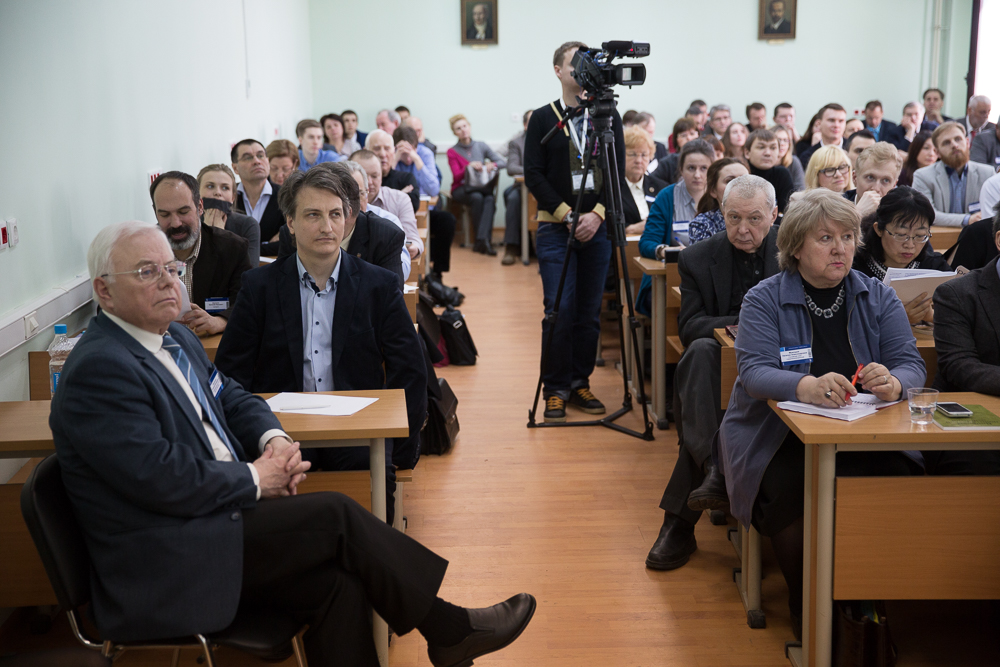
Published: March 30th, 2017
A discussion on how the new global technological structure influences the economic processes in Russia was said at the round table of the Moscow Economic Forum titled " Russian economic model in the context of global changes: threats and prospects".
According to the participants of the section, the world economy is on the threshold of the first post-industrial technological order. The breakthrough technologies of the last decades have been called the "sixth technological order" and the "fourth industrial revolution", but their influence on the Russian economic model has not been studied enough. Leading experts in the field of economics, professors of the Moscow State University, tried to give qualitative forecast estimates and normative recommendations. M.V. Lomonosov Anatoly Porokhovsky and Kaisyn Khubiyev. The round table was also attended by outstanding Russian scientists, economists, who discussed modern problems of global and national economic development.
Anatoly Porokhovsky said that in the modern world the development of any national economy depends more or less on global trends. At the same time, the protection of national interests forces the state to seek the best option for opening up its economy in order to be confident not only in the near future, but also in the long term for its citizens, society and the country as a whole.
"Russia has many advantages over other countries. But until now these advantages have not been realized so that all resources for sustainable economic growth are effectively used to ensure the proper welfare of the entire population. It was a critical time to abandon the theoretical dogmas underlying the current economic model, "Anatoly Porokhovsky believes. Only a systematic approach, according to the expert, can give a verified solution to existing problems, one should not look for a prophet in a foreign land.
Victoria Fomina, a lecturer at Moscow University, saw in global technological progress, in some ways a problem, for the Russian economy. In a country where the already low employment of the population, robotization can entail a number of problems. "First of all, structural unemployment. If the robot replaces manual operations, as, for example, ATMs do, the number of cashiers is reduced. " Moreover, many industries in Russia today are not ready for automation. For example, the sphere of housing and communal services. After all, when 70% of the pipes are worn out and there is not enough money in the budget even to patch them up, there can be no talk of data transfer via WI-FI about the state of pressure.
The expert of the section Alisa Hajiyeva told the audience about the role of the state in realizing the revolutionary potential, which has increased, judging by the statistics. However, the speaker noted the low activity in terms of development of R & D of private corporations. "The relatively low innovative activity of enterprises can be explained by the shortage of private research centers and the low demand for innovation from the business sector. Most of the innovations are not in demand by the market, according to statistics, only 2% of all innovations are commercialized, that is, they enter the market".
According to the experts of the Moscow Economic Forum, it is too early to speak about the emergence of a new technological order in Russia. The acute problem of the economy of our country remains an unfavorable investment climate, economic policy mistakes.
Oleg Komolov, representative of the Institute of Economics of the Russian Academy of Sciences, made a bold statement that without the withdrawal of Russian capital into the offshore economy will be unstable. And all obstacles to the withdrawal of money abroad today are a problem for the development of the economy. "70% of Russian capital flows into offshore. Businessmen themselves explain this by high taxes in Russia. But in reality, in my opinion, the export of capital helps the Russian government to achieve its specific goals".
In general, the alarm of experts today is caused by the negative fact that the economy still lives on commodity principles. Oil exporters feel excellent, exported to dollars abroad, while agriculture and producers of the real economy are forced to buy raw materials at inflated prices.
Latest news
07.05.2018 MEF-2018: debate "Cultural policy: between individual freedom and the interests of society?"
07.05.2018 MEF-2018: Conference No. 8
07.05.2018 MEF-2018: Conference No. 4
07.05.2018 MEF-2018: Conference No.3
07.05.2018 MEF-2018: Conference No. 2
07.05.2018 MEF-2018: Conference No.1
26.04.2018 McConnell Discusses Information Warfare
20.04.2018 MEF-2018: closing plenary session
17.04.2018 Mr. Freysinger: «Skripal’s case» for relationship between Russia und European Union?
